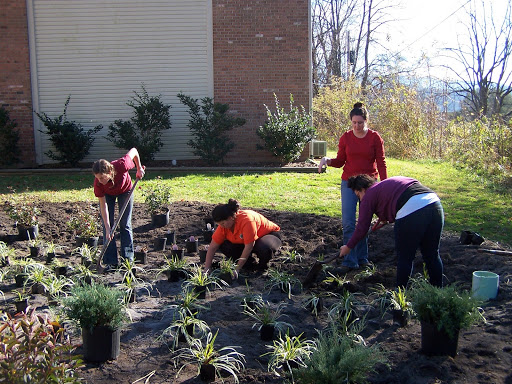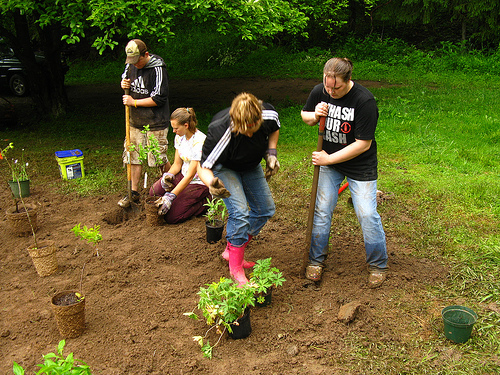Based on the work of
New River Gorge National Park Service
Southern West Virginia
Rain gardens can be excellent practical educational tools on proper stormwater management techniques. In addition to beautifying generally unused landscapes, rain gardens allow infiltration needed to recharge groundwater and prevent sediment and pollution carried by stormwater from entering surface waterways. The construction and planting of a rain garden, depending on its size, can often be completed in one afternoon, making it a good way to engage and educate volunteers. Many tasks, such as planting or mulching, are low impact and ideal for senior or youth volunteers. An OSM/VISTA serving with the National Park Service at the New River Gorge National River worked with a variety of organizations to construct rain gardens. He provided the expertise needed to assess where and what to plant in a rain garden, as well as taught associated principles of water conservation and environmental stewardship. It is necessary to seek advice and expertise on assessing locations, working with backhoe operators, recruiting and managing volunteers and the many other factors involved in constructing and maintaining a rain garden.

Tested by
Woodland Community Land Trust
Northeast Tennessee
Woodland Community Land Trust (WCLT) has had issues with heavy runoff from several roads. They have tried several different methods of controlling the problem, such as using heavy machinery, but have been unsuccessful. By working with volunteers, WCLT wanted to teach residents the skills and knowledge to install rain gardens on their own property if they have the same issues. Much of the year was spent doing research on rain gardens and how they function. Without an individual with technical knowledge to lead the project, WCLT found it difficult to implement this trial practice. They did not have enough staff and time to organize the construction of a rain garden by volunteers in addition to learning and understanding what a rain garden is and how it functions. No one had training or experience with rain gardens, so a lot of time was spent discussing the work and, since no one was in charge, everyone had their own opinion of how things should be done. This delayed the process. WCLT was able to install one rain garden that has improved a drainage problem for one local family. Though only installing one rain garden, WCLT now has a better understanding of rain gardens that can benefit additional families in the future.
Tested by
Friends of the Cheat
Northern West Virginia
Building a rain garden at the Doug Ferris Outdoor Classroom has long been a goal of Friends of the Cheat (FOC). The outdoor classroom is a watershed-focused, environmental study area for the residents of the Greater Preston County area, particularly schools, youth organizations and church groups. The ultimate goal of this trial practice was the creation of a stormwater learning station as part of the outdoor classroom. An onsite rain garden allows FOC to introduce groups to proper stormwater management techniques. The main difficulty for FOC was convincing teenagers to spend a Saturday morning digging and planting, and then to plan that event around both FOC’s and the 4-H Club’s schedules. The rain garden was installed on May 22, 2010, with eight volunteers from the Preston 4-H Club in Kingwood, WV. Ten volunteers contributed 33 hours of service to construct the rain garden that is approximately 250 sq. ft. and treats water from a 1,500 sq. ft. roof. Interpretive signs will help to educate users when FOC staff or volunteers are not present at the site. As other pieces of the outdoor classroom come together, FOC would like to host educational events at the outdoor classroom site. This will allow them to utilize the stormwater station and rain garden as a direct teaching tool.

“The funny thing is if you were to ask those kids on a Saturday morning if they wanted to go out and learn about wetlands or rain gardens most would be pretty uninterested. But if you ask them during the school day, almost all would be like, ‘Yes, yes, please can we?’ Never underestimate students’ passion for getting outside of the classroom.”
-Friends of the Cheat
